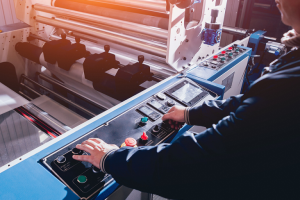
Artificial intelligence (AI) has been making headlines for months. AI can improve aspects of many industries, including manufacturing. AI has the potential to enhance efficiency, revolutionize production processes, and drive innovation. However, implementing AI in your manufacturing business comes with challenges. To meet these challenges, you’ll need a good ERP in your manufacturing operation.
To begin with, let’s look at a few ways AI can be used. AI can be used for many purposes in manufacturing. It can analyze real-time data from machines and predict when maintenance will be necessary. It can automate quality control processes, detecting defects and anomalies in products. It can optimize your supply chain, power manufacturing robots, and reduce energy usage. It can even provide real-time safety alerts.
Challenges When Using AI in Manufacturing
- Ethical & Legal Considerations
Just like generative AI models such as ChatGPT, manufacturing AI must be guided by ethics and regulations. Manufacturers must ensure accountability, transparency, and fairness in AI algorithms and address biases immediately. Remember, AI doesn’t stop to ask whether something is the right thing to do: that must always be the responsibility of the human operators.
- Integration with Legacy Systems
A powerful AI system will only provide benefits if it is integrated with your current software systems. Such integrations are complex and should be completed by specialists. You’ll need to consider compatibility, interoperability, and scalability of the integrations.
- Scalability & Flexibility
Just like any other software system, AI solutions must be flexible enough to grow and change along with your operations. Envision your company five or ten years in the future: can a given AI solution accommodate where you want your company to be at that time?
- Trust & Acceptance
This may be the easiest challenge to overcome—or the most difficult. Many people are passionate about the power of AI, and just as many are skeptical or even suspicious of its value and function. You’ll need to work with your employees to address their qualms about AI and demonstrate the system’s reliability, transparency, and accuracy—as well as the steps you’ve taken to maintain ethical and legal boundaries.
- Workforce Readiness
Encouraging your employees to accept the AI system is only half the battle. You then must provide training and development programs to bridge the new skill gaps AI may create in your business. A software solution depends on skilled employees to be successful.
- Data Availability & Quality
AI systems work by taking in and analyzing vast quantities of data to look for patterns and anomalies. You must ensure that all relevant data flows into your AI system. Not only that, but the data must be available, structured, and properly labeled. If you feed bad data to an AI system, it will make bad decisions based on that data.
Meet These Challenges with a Manufacturing ERP
While utilizing an ERP in your manufacturing business will not solve all these challenges, it can alleviate many of them. An ERP collects all your business data in one place, reducing manual errors and streamlining processes. Using an ERP for manufacturing instead of many different software programs can make integration much easier—in fact, some ERPs already have AI functionality built in! An ERP grows with your manufacturing business and is flexible enough to handle growth and automation.
Want to Learn More?
If you’re searching for an AI-powered ERP, look no further than Acumatica, a modern system that incorporates AI whenever possible. Interested in the impact AI and an ERP can have on your manufacturing business? Talk to our experts at Emerald TC. We can help with ERP implementation, integration, and customization, allowing you to take full advantage of advanced software and AI.

